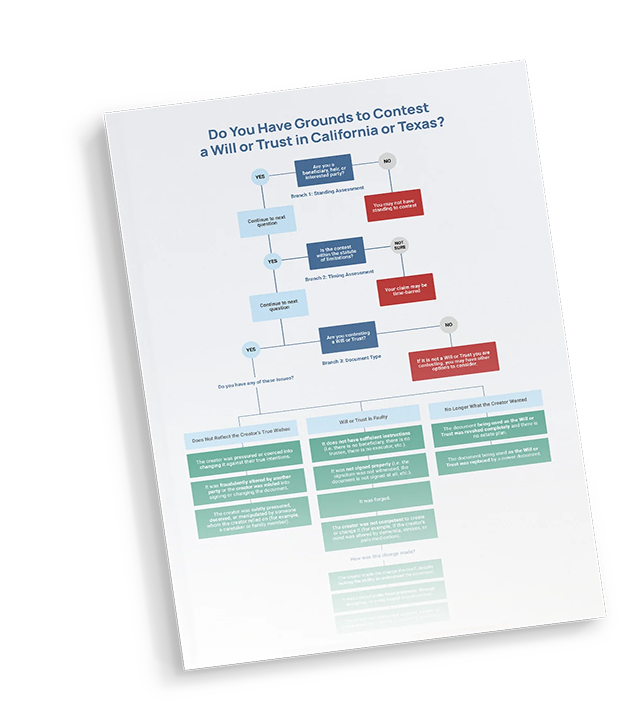Do You Have Grounds to Contest a Will or Trust?
Our Decision Tree Can Help You Determine If You Have a Case
If you are considering contesting a will or trust, it’s critical to assess whether you have a valid legal claim before spending time and resources pursuing the contest. Our downloadable decision tree walks you through key factors, such as allowing you to consider if you have standing, whether your claim is within the statute of limitations, and the various legal issues that could impact the strength of your case.
Our decision tree will provide initial insight into whether you have solid grounds for a will or trust contest—if you believe you have a strong claim, it’s wise to consult a probate litigation attorney at RMO for further guidance on how to contest a will or trust.

What You'll Learn From This Infographic
Our decision tree offers a step-by-step roadmap of key considerations you should make before pursuing a will or trust contest. This asset will empower you to understand your legal standing and grounds for a potential will or trust contest claim by assessing the following factors:
- Whether you have legal standing to contest a will or trust
- If your claim is still within the statute of limitations
- If your concern warrants legal grounds for contesting a will or trust, as improper execution, undue influence, fraud, or lack of mental awareness
- How various issues may affect the strength of your case
- What steps to take next if you have a strong or moderately strong case
Ultimately, this guide allows you to assess your situation and determine if legal action is the most feasible path forward. If you believe you have a valid case, it’s wise to consult with an experienced trust or probate litigation attorney at RMO LLP to discuss your options regarding how to contest a will.
How to Use This Infographic
This downloadable decision tree consists of multiple questions to assist you in determining whether you have a case to pursue a valid will or trust contest. Following this graphic step by step will help you understand the strength of your potential case.
Branch 1: Standing Assessment
Step one of the tree will ask you to identify whether you are an interested party in an estate or trust. An interested party is most often an identified beneficiary in a will or trust or a legal heir under state intestacy laws, depending on whether the deceased left a will. Other interested parties may include creditors, omitted heirs, or other relatives of the deceased.
If you do not have legal standing as one of these interested parties, you may not be able to contest a will or trust.
Branch 2: Timing Assessment
The next section will ask whether your prospective contest falls within the statute of limitations of the claim. The statute of limitations for a will or trust contest may vary by state.
In California
You have 120 days to contest a will or trust from either the date the will is admitted into probate or a trustee provides a Notification of Trustee (16061.7 Statutory Notification).
In Texas
You have two years from the date a will is admitted into probate or four years from the date of discovery of an issue with a trust. However, it is possible and advisable to contest a will before it’s admitted into probate.
During this step, confirm whether you are raising your claim within the statute of limitations. If not, your case may be time-barred, but you should still consult with a qualified will or trust contest attorney to confirm.
Branch 3: Assess the Grounds for Contesting
Next, the tree will prompt you to identify whether you are contesting a will or trust, or something else entirely.
For Wills & Trusts
A will is a legal document created by an individual to provide instructions for the administration and distribution of their assets after their death. To challenge a will, you must prove that it was improperly executed, was wrongly influenced by another individual, or that the creator lacked the ability to understand the will at the time it was executed. Common issues leading to will contests often fall into one of the three following categories.
Will or Trust Does Not Reflect the Creator’s True Wishes
- The creator was pressured or coerced into changing it against their true intentions.
- The will or trust was fraudulently altered by another party or the creator was misled into signing or changing the document.
- The creator was subtly pressured, deceived, or manipulated by someone whom the creator relied on (for example, a caretaker or family member).
The Will or Trust Is Faulty
- The will or trust does not have sufficient instructions (i.e. there is no beneficiary, there is no trustee, there is no executor, etc.)
- The will or trust was not signed properly (i.e. the signature was not witnessed, the document is not signed at all, etc.)
- It was forged.
- The creator was not competent to create or change it (for example, if the creator’s mind was altered by dementia, strokes, or pain medication)
The Will or Trust Is No Longer What the Creator Wanted
- The document being used as the will or trust was revoked completely and there is no estate plan.
- The document being used as the will or trust was replaced by a newer document. In California, if you discover a valid, more recent version you must act quickly as there is an additional time limit to consider.
At the same time, you should examine the root cause that led to the changes you are contesting.
How Was this Change Made?
- The creator made the change themself, despite lacking the ability to understand the document.
- The will or trust was created under false pretenses, through deception, or using forged documentation.
- The creator was pressured, coerced, misled, or manipulated into creating or adjusting/amending it.
For Other Documents or Arrangements
If you are not contesting a will or trust, you may be questioning other important documents, asset arrangements, or methods to transfer an inheritance. Notably, powers of attorney may be challenged if there are concerns about abuse of authority, lack of capacity, or undue influence. Beneficiary designations on life insurance policies, retirement accounts, and payable-on-death (POD) accounts can also be challenged, especially if changes were made without the ability to fully understand them or under suspicious circumstances. In addition, disputes may arise over joint tenancy or survivorship arrangements, particularly if someone was added improperly to title.
Gifts made shortly before death, trust amendments or restatements that significantly alter an estate plan, and contracts such as family settlement agreements or prenuptial agreements may also be challenged. Even deeds, like transfer-on-death (TOD) deeds, can be contested if there is evidence of fraud, undue influence, or lack of capacity. In short, if you are not contesting a will or trust, you are likely challenging the transfer of assets outside of probate or the authority someone exercised through a legal document. If you have questions about challenging a power of attorney, beneficiary designation, or other asset transfer, contact an experienced attorney to help protect your rights and navigate the process.
Evaluate Case Strength
Upon considering your answers to each of the above questions in the decision tree, you can evaluate the strength of your overall case.
Green = Strong Case
Red = Moderate Case, But Worth a Consultation
Regardless of the outcome of this decision tree, it’s crucial to consult with an experienced attorney. These cases involve many complex factors and nuances that could impact your situation in ways you may not have considered. During a personalized consultation, we’ll ask the necessary questions based on the specifics of your case, helping you fully understand your options and the best course of action moving forward.
No matter the result, consulting with RMO’s probate and trust litigation attorneys will help you explore your potential options and next steps. Seeking legal advice as early as possible in the process is advisable, as it can significantly increase your chances of raising a valid claim and securing the best possible outcome. With decades of experience in estate and trust litigation, the attorneys at RMO will evaluate the strength of your case and develop a winning strategy to secure your rightful inheritance and protect the best interests of your loved one’s estate.
Then, schedule a consultation with the team at RMO to review your findings together and discuss how to contest a will or trust with the greatest chances of success.
Free Consultation
A member of the RMO Client Relations team will reach out to gather additional information concerning the parties to your case and schedule your consultation.
Communication Disclaimer
Please note that communications by you to RMO LLP or any of its lawyers through this website do not create an attorney-client relationship between you and the firm. Do not send any privileged or confidential information to the firm through this website or otherwise until instructed in writing from us to do so.

